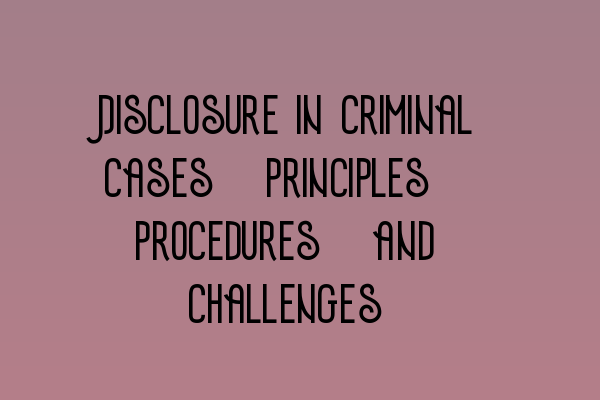Disclosure in Criminal Cases: Principles, Procedures, and Challenges
Disclosure in criminal cases is an essential aspect of the criminal justice system in the UK. It ensures fairness, transparency, and the right to a fair trial for both the prosecution and the defence. In this blog post, we will explore the principles, procedures, and challenges associated with disclosure in criminal cases.
The Principles of Disclosure
The principles of disclosure are founded on the idea that both parties in a criminal case must have access to all relevant evidence to adequately prepare their case and prevent any surprises during the trial. The disclosure process is governed by the Criminal Procedure and Investigations Act 1996 and the Criminal Procedure Rules. These laws outline the obligations of the prosecution to disclose evidential material, as well as the defence’s duty to disclose their case to the prosecution.
To ensure compliance with the principles of disclosure, it is crucial for legal professionals to stay informed and prepared. Workshops and seminars on criminal practice, such as those offered by SQE Criminal Law & Practice Law UK, provide an excellent opportunity for legal professionals to expand their expertise and enhance their understanding of disclosure requirements. Workshops and Seminars on Criminal Practice: Expanding Your Expertise
The Disclosure Procedure
The disclosure procedure involves the identification, acquisition, and sharing of relevant evidence between the prosecution and the defence. The prosecution has a duty to review and disclose all material that is relevant to the case, whether it supports the prosecution’s case or undermines it. Similarly, the defence must disclose any material that supports their case or raises doubts about the prosecution’s case.
Staying updated with the latest updates in UK criminal laws is crucial for legal professionals to navigate the disclosure procedure effectively. By staying informed, legal professionals can ensure they are compliant with any new regulations or changes in the law. Updates in UK Criminal Laws: Staying Informed and Prepared
Challenges in Disclosure
While disclosure is vital for a fair trial, it also presents various challenges. One significant challenge is the volume of digital evidence available in today’s digital age. With the increasing use of technology, there is often a vast amount of electronic data that needs to be reviewed and disclosed. Managing and analyzing this data can be time-consuming and resource-intensive.
Enhancing your SQE Criminal Law study group experience can be beneficial when facing challenges related to disclosure. Collaborating with fellow students and discussing different approaches to dealing with disclosure issues can help enhance one’s understanding and problem-solving skills. Enhancing Your SQE Criminal Law Study Group Experience
The Way Forward
Decoding criminal evidence rules is crucial for legal professionals to navigate the disclosure process successfully. A detailed analysis of these rules can provide insights into the principles, procedures, and challenges associated with disclosure in criminal cases. Understanding the intricacies of criminal evidence can enhance a legal professional’s ability to effectively represent their clients.
For a more comprehensive understanding of fraud and financial crimes in the UK, legal professionals can benefit from a deep dive into the subject. This in-depth analysis can shed light on the specific challenges and disclosure requirements associated with these types of cases. Deep Dive into Fraud and Financial Crimes in the UK
In conclusion, disclosure in criminal cases plays a vital role in ensuring a fair trial for all parties involved. Legal professionals must understand the principles, procedures, and challenges associated with disclosure to effectively navigate the criminal justice system. By staying informed, continuously expanding their expertise, and collaborating with peers, legal professionals can enhance their ability to handle disclosure issues and achieve favorable outcomes for their clients.
